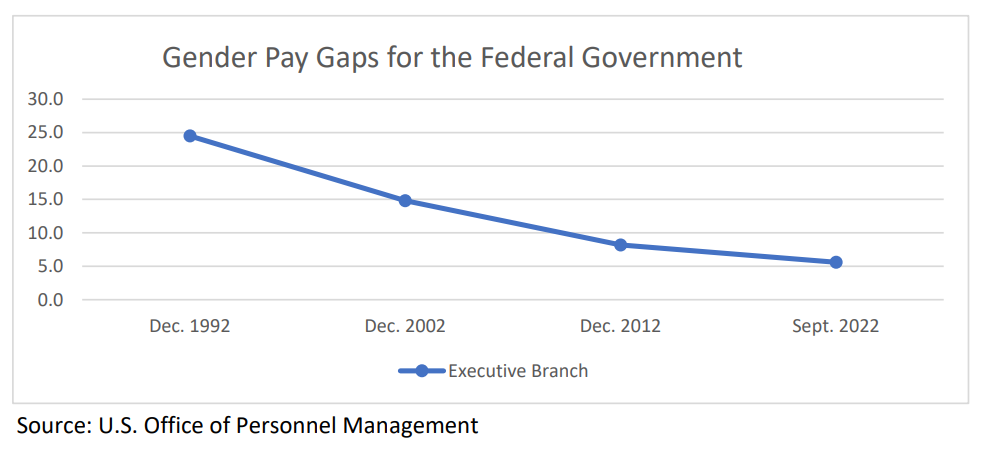
OPM addresses gender pay gap, proposes ban on agencies’ use of salary history for new hires
Proposed regulations from the Office of Personnel Management would prohibit agencies from using a federal job candidate’s previous salary history when making ...
The Office of Personnel Management, looking to fully close the gender pay gap in the federal workforce, is taking a new approach to try to level the playing field for new federal hires.
Proposed regulations OPM published Wednesday would bar agencies from using a federal job candidate’s previous salary history when setting pay as part of an employment offer.
OPM’s proposal aims to address the pay disparity between men, and women and racial minorities, in the federal workforce. In 2022, women federal employees’ pay trailed behind that of their male counterparts by an average of 5.6%. In other words, women made 94.4 cents for every dollar men made in the federal workforce.
“Relying on a candidate’s previous salary history can exacerbate preexisting inequality and disproportionally impact women and workers of color,” OPM Director Kiran Ahuja said in a press statement Wednesday.
The numbers are more striking for women of color in the federal workforce. OPM’s 2022 data showed, for example, a pay gap of 15.2% between Black women and white men, and a 27.2% gap between American Indian and Alaskan Native women and white men.
The 5.6% average pay gap is a slight improvement from the 5.9% gap in 2021. And it’s significantly smaller than it was 30 years ago — 24.5%. The current gender pay gap in the federal sector is also smaller than the 16% gap in the private sector.

Still, OPM’s proposed regulations are a step toward the agency’s goal of completely closing the pay gap in the federal government, an objective included in OPM’s strategic plan for fiscal 2022 through 2026. OPM’s initial plans to propose regulations regarding the hiring and pay-setting processes were included in a Performance.gov report last June.
OPM’s current regulations do not require federal job applicants to share their salary history for an agency to make a hiring or pay-setting decision. But current regulations do let agencies request an applicant’s salary history, and then use that information to help set the applicant’s starting pay rate.
Under OPM’s new proposal, agencies would not be allowed to consider an applicant’s salary history at all when setting pay for newly appointed federal employees, which extends to employees who have previously served in the federal government. Agencies would be able to make an exception and consider salary history when a candidate has a competing job offer, but would still have to consider at least one other factor when setting pay. The regulations would not change the pay-setting rules for promotions of employees already in government.
OPM’s regulations, once finalized, would apply to pay-setting procedures for new federal employees in the General Schedule, Prevailing Rate, Appeals Judge and Administrative Law Judge pay systems. The regulations do not apply to employees in the Senior Executive Service, Senior-Level or Scientific or Professional pay systems.
For the federal workforce, the gender wage gap exists, in part, because of the demographics of federal employees on the General Schedule. Women — especially women of color — occupy more positions lower on the GS pay scale, while men are more highly represented in higher-paying positions in the Senior Executive Service, OPM said in the proposed regulations.
OPM’s proposal would approach the disparity by trying to remove potential biases stemming from federal job candidate’s previous pay rates, which can often mean higher salaries for men than for women.
“Research shows that implementing salary history bans can narrow the gender wage gap. Research also shows salary history bans increase wages and reduce pay disparities for workers of color compared to white workers,” OPM said in a press release Wednesday.
The Department of Justice Gender Equality Network (DOJ GEN), an employee advocacy group historically vocal on the topic, urged OPM last November to include in the regulations a full ban of agencies’ consideration of salary history, and go beyond only banning solicitation of salary history during the federal hiring process.
“Using salary history or a competing job offer to set pay means the federal government defers to what an unrelated company thought the candidate should earn, instead of the federal agency itself determining the value of the new employee,” DOJ GEN board member Liza Zamd told Federal News Network.
Zamd said she was “thrilled” to see this recognition from OPM in the new proposed regulations.
“The current practice of using salary history to set pay means that people who had the privilege of a higher-paying job keep that privilege when entering the federal government, while those who initially took lower-paying jobs — often because they chose public service work at non-profits or state and local governments — are penalized. As OPM notes, women and people of color are often the ones who are negatively impacted by these policies,” Zamd said.
But looking at the use of salary history is just one part of much larger pay issues in the federal workforce. Ronald Sanders, former chairman of the Federal Salary Council from 2017 to 2020, said the proposed regulations are a positive step, as they would begin to remove stricter levels of seniority in the civil service, but the ultimate impact may be minimal. The rigidity of the General Schedule creates persistent pay inequity in the federal workforce, he said, beyond candidates’ first entry into the civil service.
“You can literally spend a couple of decades in a particular GS grade and progress through that, based strictly on years of service,” Sanders told Federal News Network. “If you happen to enter the federal workforce at an earlier time, when, frankly, white males dominated the labor market, you could progress without really much getting in your way.”
For current employees changing positions or getting promoted, agencies would still have to default to more stringent classification standards. Reforming the way agencies assess current federal employees up for promotion would make a much larger impact, Sanders said.
The responsibility of carrying out OPM’s proposed regulations would also fall largely to hiring managers, Sanders said. They would have to change their assessments of candidates to include other methods of setting pay.
“It’s going to mean that much more pressure on federal agencies,” Sanders said. “If you can’t use salary history, you have to use something else. That means you have to use assessments or performance on the job. It’s going to take trained managers to evaluate a candidate.”
OPM’s proposed regulations align with the executive order on diversity, equity, inclusion and accessibility that President Joe Biden signed in 2021. Specifically, the executive order called on OPM to review governmentwide regulations related to pay and address any inequities, in an effort to advance equal pay.
The proposed regulations on prohibiting the use of salary history in federal pay-setting will be published to the Federal Register later today, and will remain open to public comments for the next 30 days.
Copyright © 2024 Federal News Network. All rights reserved. This website is not intended for users located within the European Economic Area.
Drew Friedman is a workforce, pay and benefits reporter for Federal News Network.
Follow @dfriedmanWFED




